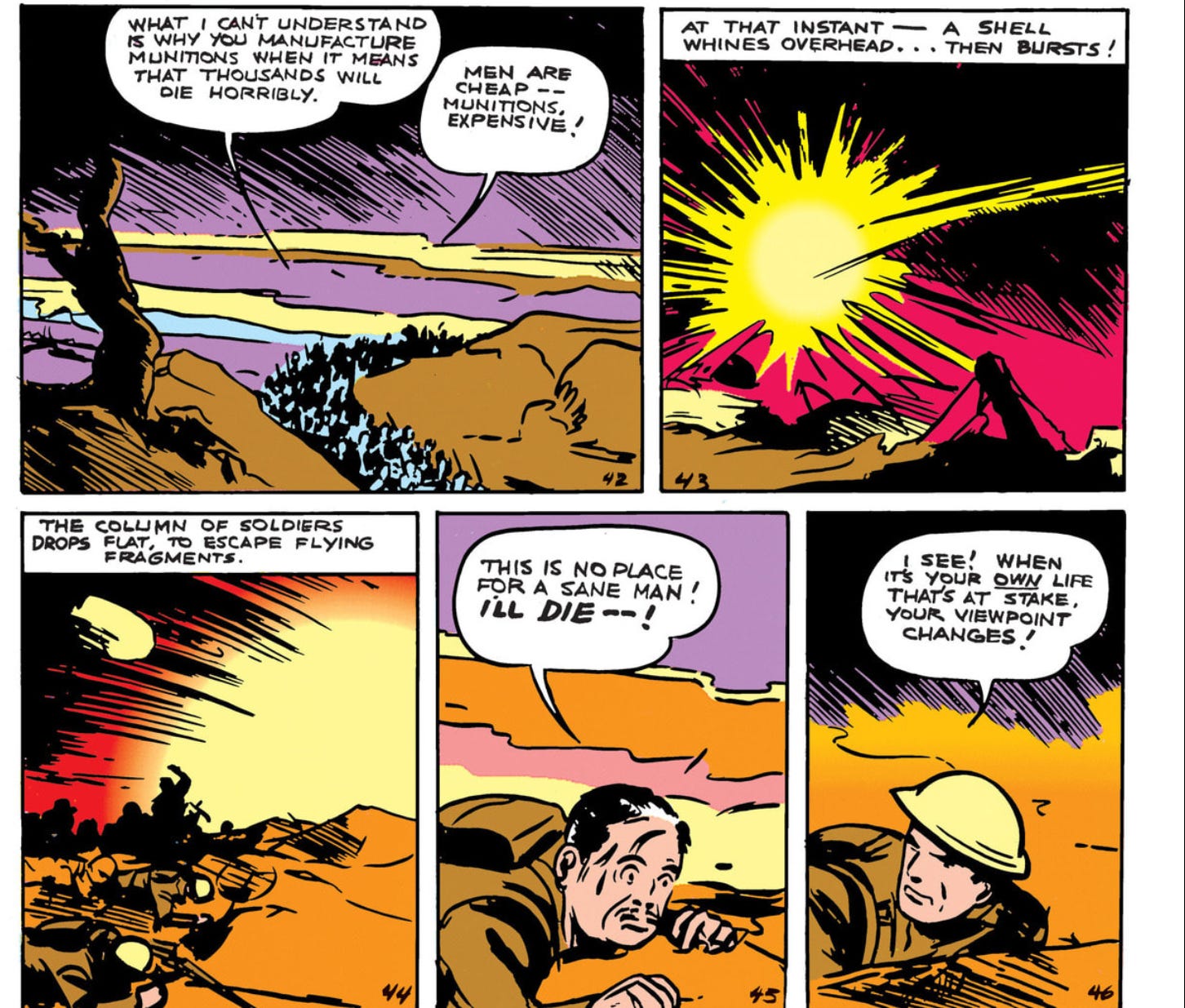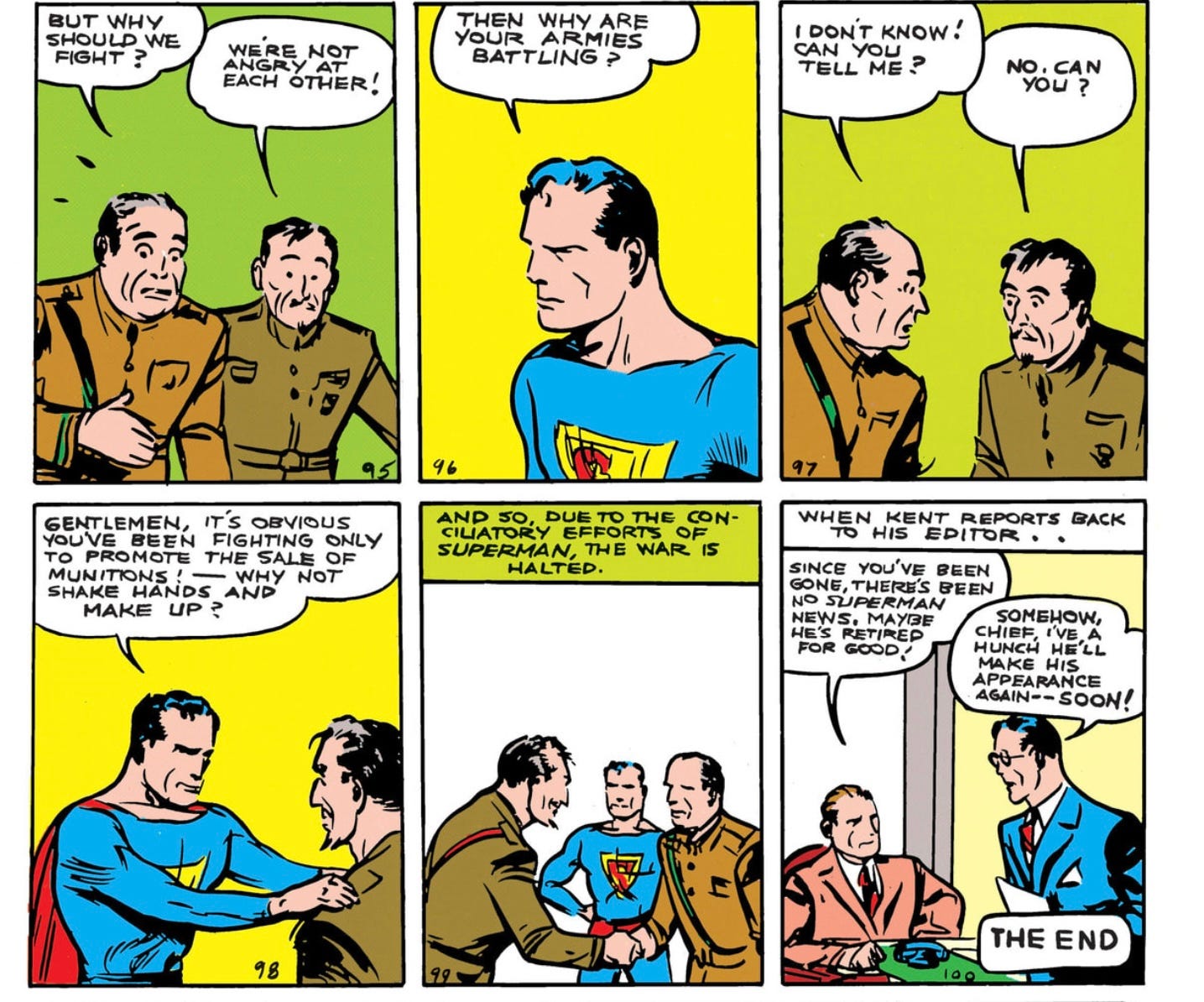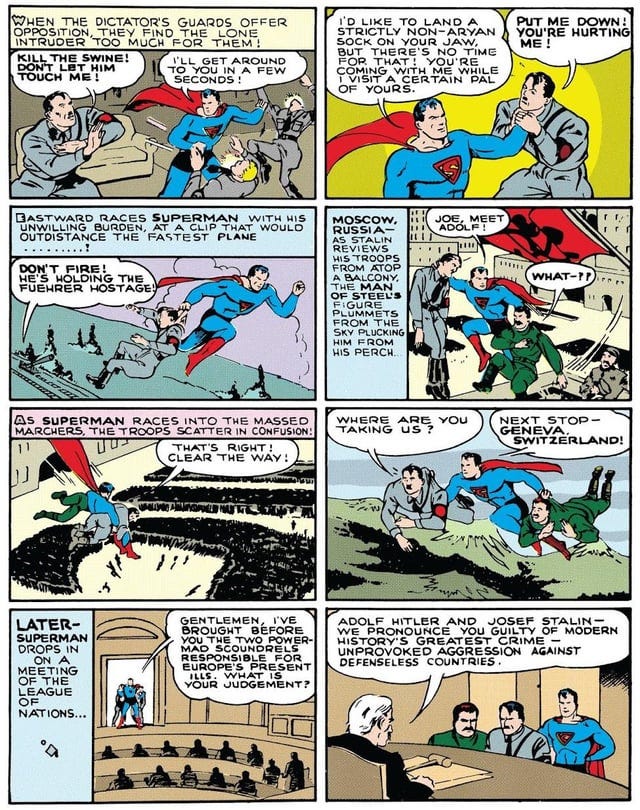Superman Doesn’t Hate Israel. He Just Doesn’t Like Bullies.
Lot of hit dog will holler responses to James Gunn’s Superman movie.
“Even Superman hates Israel,” poet Remi Kanazi posted on social media. I checked, and he’s actually a real person, not one of Lex Luthor’s rage-provoking online monkey trolls. He later admitted that he hadn’t yet seen James Gunn’s Superman and has “no idea if the villain in the film is Israel. But I think it’s hilarious that Zionists are freaking out over it.” This is even beneath the standards of Luthor’s monkeys.
Both sides of this particular political divide have interpreted an anti-Israel message in the movie, whose plot hinges on Superman’s decision to stop the fictional nation of Boravia from invading the equally fictitious neighboring country Jarhanpur, whose population is predominately brown. “It is the most obvious fuck Israel thing I have ever seen in my whole life,” Hasan Piker said, seemingly oblivious to the many overt “fuck Israel” sentiments expressed online that don’t use fake country names.
Gunn has confirmed that he didn’t intend for any real-world political commentary. Also, Russia invaded Ukraine on February 2022. Gunn completed the script for what was then called Superman: Legacy in April 2023. Hamas attacked Israel in October 2023. We might never know the true order of events.
In our own sad reality, Donald Trump and MAGA have sided with brutal dictator Vladimir Putin and abandoned our actual ally Ukraine. That’s too much mustache-twirling for even a comic book movie so Boravia is depicted as a U.S. ally and Jarhanpur is a nation with a troubled past. True to his nature, Superman supports the underdog and believes in their potential as a free people. This was probably done to add complexity to Superman’s choice, but it obviously isn’t an Israel/Gaza parallel. If Boravian President Vasil Ghurko (Zlatko Buric) feels as believable a stand in for Israeli Prime Minister Benjamin Netanyahu as he does for Putin, then that should cause some somber self-reflection, not finger-pointing accusations.
During an interview/couples quarrel with Lois Lane (Rachel Brosnahan), Superman (David Corenswet) explains that he directly confronted President Ghurko and told him to lay off the whole bloody invasion. He said if there were any further unprovoked action, they’d have a more serious discussion. This was a gratifying moment. We are used to seeing Batman threaten criminals into testifying against mobsters, but this was more than just physical intimidation. Superman set himself up as his own personal weapon of mass destruction. He doesn’t have to break anyone’s arm to prove his point. He out nukes nuclear weapons. Deep down, we all wish Superman would take Putin for a quick flight until he peed his pants and agrees to leave Ukraine alone.
Gunn acknowledges that this is a complex issue, as Lois challenges Clark on what many might perceive as well-intentioned yet dangerous naïveté. His actions are also contrasted with the later reveal that his Kryptonian parents sent him to conquer Earth. By imposing his will on others, is he following the authoritarian path Jor-El and Lara intended for him?
The Christopher Reeve Superman was expressly forbidden to interfere in human history, a vow he broke once to save Lois Lane but not to end world hunger. Gunn’s Superman is no passive observer. He’s a citizen of the world with a moral obligation to defend the weak from anyone who abuses their power. He is quite literally the Superman Jerry Siegel and Joe Shuster created.
For example, in 1938’s Action Comics No. 1, his very first appearance, Superman investigates a munitions magnate who is promoting war in a small South American country. By the next issue, Superman has forced the war profiteer to join the army and serve on the front lines. “What I can’t understand is why you manufacture munitions when it means that thousands will die horribly,” Superman asks, and the magnate coldly responds, “Men are cheap. Munitions, expensive.” However, he soon changes his mind once his own scuzzy life is on the line. “This is no place for a sane man!” he whines on the battlefield. “I’ll die!”
Superman later kidnaps the commanders from the warring armies. “I’ve decided to end this war by having the two of you fight it out between yourselves.” (My son agrees that this seems more straightforward.) The commanders don’t even know why they’re fighting, and Superman says, “It’s obvious you’ve been fighting only to promote the sale of munitions — why not shake hands and make up?”
The nation of Boravia first appeared in a story from 1939’s Superman No. 2, “Superman Champions Universal Peace.” Boravia is embroiled in a civil war, but neither faction will budge on their rigid demands. Negotiations are going nowhere, so Superman “persuades” them to see reason.
Siegel and Shuster published a special two-page story in Look Magazine that imagined how Superman would end World War II. This was 1940, a full year before the U.S. entered the war. In fact, the same issue featured the cover story, “What It Means To Be Neutral,” but Siegel and Shuster understood that neutrality in the face of evil only enables further wrongdoing. In their story, Superman has enough of the bloodshed. He travels to Germany, captures Hitler, and pointedly says, “I’d like to land a strictly non-Aryan sock on your jaw.” Then he goes to Russia and picks up Stalin (this is before Germany turned on the Soviet Union). He takes both men to the League of Nations to answer for their crimes.
There’s a moving scene in Grant Morrison’s All-Star Superman — an inspiration for Gunn’s film — where Clark speaks at his father’s funeral: “Jonathan Kent taught me that the strong have to stand up for the weak and that bullies don’t like being bullied back.” It’s a simple but profound statement of Superman’s true purpose, as envisioned by his creators. Superman is here for a reason, and that reason isn’t scoring touchdowns or even maintaining the status quo while bullies stomp over us unchallenged. When Corenswet’s Superman firmly tells Ghurko that he won’t let him invade a defenseless nation because “that’s not right,” he’s standing up to a bully.
The further Superman strayed from Siegel and Shuster’s original creation, the more he mellowed into a “safe,” politically neutral figure. This is the version Frank Miller’s Batman condemns in 1986’s The Dark Knight Returns: “You always say ‘yes’ to anyone with a badge and a flag.”
In the 1986 Legends miniseries, Darkseid uses propagandist G. Gordon Godfrey to turn humanity against its heroes. President Ronald Reagan even passes an executive order banning them from operating publicly. Notably, Batman ignores the order, but Superman obeys it. That’s alarming, considering that while the Gotham PD might possibly get through a week without vigilante assistance, Superman literally stops planes from crashing.
That’s what sets Corenswet’s Superman apart from past versions of the character. He doesn’t reflexively say “yes” to anyone with a badge or a flag, but he does say “yes” when it’s time to act for what he believes is right. It’s inspiring to see a hero’s moral authority at a time when there is far too much moral neutrality.










Interesting that all of the worst people in the country reflexively think that the bully country is a stand-in for Israel. Also interesting that they whine about Gunn's Superman being woke, when he is as woke as the original Superman. Yes, Superman was woke before WWII.
Unfortunately "complex" and "nuance" are not really something that is part of a lot of online Discourse™ it seems, so I can see how certain conclusions are jumped to.
No matter what, given how this is all going, it's going to end very badly.